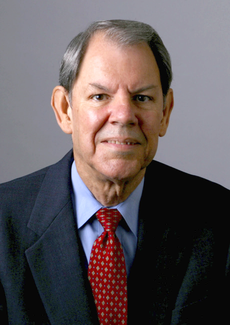University provost and vice president for academic affairs Carroll J. Falcon will retire at the end of this semester after more than 30 years with the University and more than 40 years in higher education. Falcon, who received his baccalaureate degree from the University of Southeastern Louisiana and his master’s and doctorate from the University of Kentucky, came to Nicholls in 1967 as a professor of animal science. He became department head shortly after and then dean of the College of Life Sciences and Technology in 1978.
The Rayne native stayed with the University until 1994, when he became the provost and vice president of academic affairs for the University of Louisiana System. He returned to Nicholls 10 years later as the provost and vice president for academic affairs-a change he said came at the right time.
“I came here just a year before the selective admissions criteria was brought to Nicholls, so it was a very exciting time,” Falcon said. “I was involved in those very first years when we began to see the type of students admitted change, and we also began to see the emergence of the community college system with Fletcher.”
Falcon worked with Fletcher to offer students dual admissions and with University President Stephen Hulbert to ensure scholarships are available to students in an effort to provide locals with various opportunities to obtain a higher education.
“We’ve been often cited as having a model for other local community colleges and universities to follow in terms of providing access to higher education for the people of our area,” Falcon said.
Falcon is also proud of the quality administrative staff selected over the years and the accreditations the University has achieved, he said.
“I can’t take all the credit for that,” Falcon said. “In my position, what is expected of me is to facilitate. I just encourage people and work with people.”
Falcon has also strived to maintain communication between colleges and departments on campus through academic councils, which permits them “to share with each other and learn from each other, and it’s resulted in these people having networks, which has been useful for all of us.”
Falcon’s retirement comes after 43 years in higher education. His wife Deanna encouraged him to make the decision, at a “point where I’ve devoted enough time to my career,” he said.
Falcon said once he leaves the University, he will spend much of his time with his three grandchildren-two, four and six years old-and pursuing his hobbies, including woodworking, genealogy and yard work.
“I used to enjoy mowing my own lawn, and my wife got me out of that a few years ago and hired someone,” Falcon said. “Turns out the guy she hired is 80 years old. Maybe that’s the secret to longevity-get a lawn mower and start cutting your own grass.”
But among all his pastimes, Falcon said his favorite thing to do is travel.
“My son and I, every summer, we take a trip. In the U.S. there’s only five or so states we’ve not seen,” Falcon said. “He’s already told me this summer, we’ll just fly to San Diego, rent a car and drive back and hit as many national parks on the way. He and I both love national parks.”
But even after he retires, Falcon said he will miss the University, particularly “the interactions with people, the students and faculty. I’ve enjoyed that because they’re stimulating and challenging. That’s what I’ll miss the most.”
The University will appoint someone to take Falcon’s place for the 2010-2011 academic year and then begin a search for a permanent replacement.








